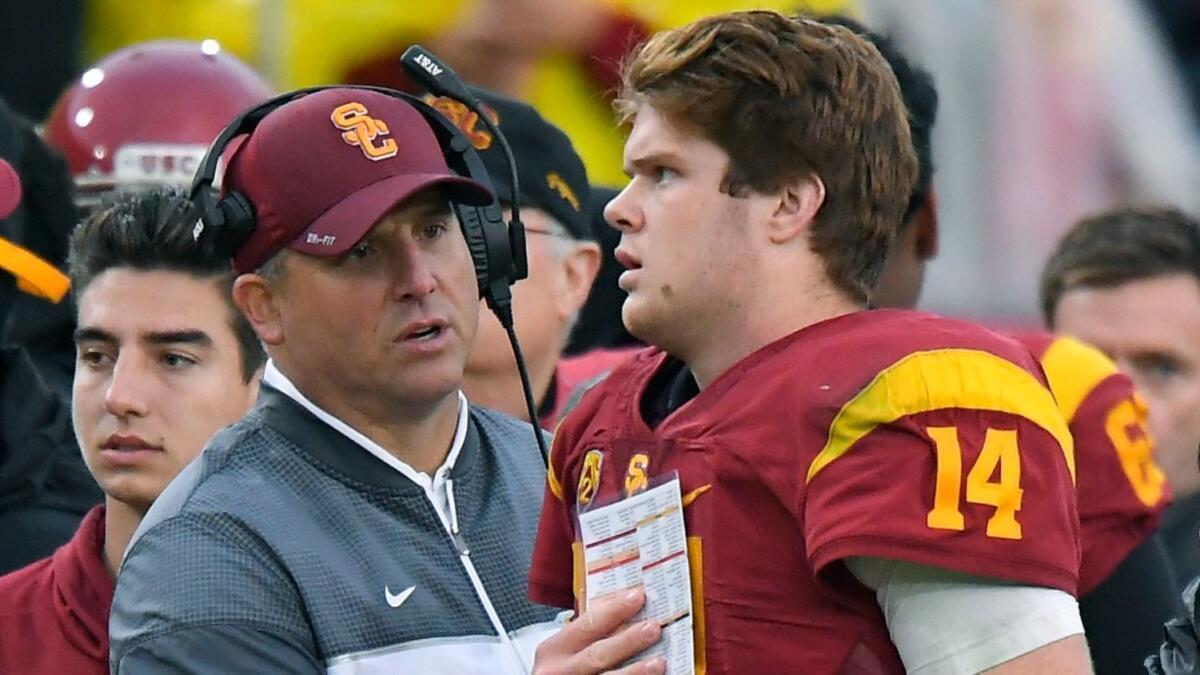Clay Helton switched quarterbacks, and it led USC to an improbable Rose Bowl meeting with Penn State

- Share via
USC Coach Clay Helton usually carries a small piece of paper, marked up with topics he wants to discuss, when he meets with reporters after practice. One day in mid-September, he gripped in his hand news of the sort that can alter seasons and make or break careers.
He began speaking, glancing up occasionally.
He said he’d “made the decision for our football team that we would make a change at quarterback.”
Sam Darnold would replace Max Browne, he went on, a move Helton hoped would provide the spark his team had been missing.
Darnold, a freshman from San Clemente High, said he’d had no idea the change was coming.
“I’m stoked,” he said at the time.
USC lost Darnold’s first start four days later, a crushing collapse against Utah. The Trojans were 1-3. Yet it was in the moments after that game, Helton said, that he first realized the team had what it took to win, even make it to the Rose Bowl game.
“My heart hurt,” Helton recalled on Saturday, “but I was smiling,”
Helton was speaking at his last news conference of the season. On Monday, his team will meet Penn State in an improbable Rose Bowl game.
The decision to entrust the offense to Darnold led USC here. Darnold’s immediate brilliance made it easy to forget that Helton’s decision was unpopular at the time. Since then, the Trojans have hardly played in a close game.
But they have not seen a team like Penn State, a team a lot like themselves. Penn State in September was a slumbering giant run down by NCAA sanctions and the fallout from one of the worst episodes in sports history, a child sexual abuse scandal involving former assistant coach Jerry Sandusky. Penn State dropped to 2-2 the same week USC lost to Utah. Neither has lost since.
“You could make an argument that their program and our program may be two of the hotter teams in college football at the end of the season, and both had similar stories,” Penn State Coach James Franklin said. “So I don’t know if you could have written a better script for the Rose Bowl.”
The matchup has become the most anticipated non-championship bowl game of the season. Tickets for the Rose Bowl were selling on the secondary market for about 50% more than either playoff semifinal game, according online ticket reseller Rukkus.com. Only the national championship game was selling for more.
Fans willing to shell out get to witness two of the better quarterbacks in college football. Darnold has thrown for 2,633 yards with 26 touchdowns and eight interceptions in nine starts. Trace McSorley has thrown for 3,360 yards with 25 touchdowns and five interceptions in 13 starts.
Darnold is more physically imposing, but both share a similar style, using their legs to extend plays until a receiver pops open. Both said they saw similarities.
“I just know he’s a really great player,” Darnold said. “Our defense talks about him all the time as a great player and a guy that can make plays.”
The running backs are also similarly matched. USC’s Ronald Jones II has averaged 6.5 yards per carry this season, and 148 yards and two touchdowns per game over USC’s last five contests. It was this type of production that made him the top-ranked running back in the 2015 recruiting class, according to ESPN.
Penn State’s Saquon Barkley is familiar with that list, which had him ranked No. 24. Barkley said he felt slighted. He memorized the names ahead of him, including Jones.
“I wanted to prove them wrong,” Barkley said.
Barkley, it turned out, had a point. He rushed for 1,302 yards and 16 touchdowns this season and was the Big Ten Conference’s offensive player of the year. He is bigger than most backs with his speed and faster than most backs with his size. During the spring, Barkley ran the team’s fastest 40-yard dash (4.38 seconds, according to strength and conditioning coach Dwight Galt). Then he tied the program’s record by power cleaning 390 pounds.
“We all know what kind of runner he is,” USC defensive tackle Stevie Tu’ikolovatu said. “We’ve got to tackle him with two, three, four of our guys to get him down.”
Penn State has been one of the nation’s best second-half teams, scoring about 50% more after halftime than before the break. In the fourth quarter alone, it has outscored opponents 124-24.
“Just when you think you have enough, you better put two or three more up or they’re going to catch you,” Helton said.
Barkley credited Penn State’s balance for the second-half success. The running back’s early punishment sets up devastating play-action passes later. He expected the formula to hold against USC.
“I think we match up really well, to be honest,” Barkley said. “You focus on one part of our game too much, we beat you with another part of the game.”
This is USC’s 33rd Rose Bowl game appearance — it has won 24 times, including both times it met Penn State — and keeps alive an unusual streak. USC has played in the game during the term of every United States president starting with Calvin Coolidge in 1929.
Any hope of extending that streak seemed to be extinguished for USC after its loss to Utah in September.
Helton said he thought otherwise. In the locker room in Salt Lake City, he realized USC had found its quarterback. He thought the Trojans were on the precipice. He told the players that if they continued improving as they had, they’d end the season “really happy.”
On Saturday, Helton sat at a podium, in front of a helmet with a rose logo on the side, and said, “You look up, and we were fortunate enough to run off eight straight and be in the granddaddy of them all.”
Follow Zach Helfand on Twitter @zhelfand
ALSO
Penn State’s road to the Rose Bowl
Last of Paterno-era recruits poised for ‘storybook ending’ in Rose Bowl
Go beyond the scoreboard
Get the latest on L.A.'s teams in the daily Sports Report newsletter.
You may occasionally receive promotional content from the Los Angeles Times.




